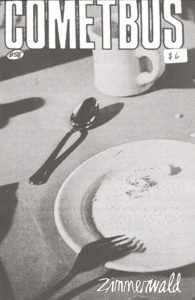
Zimmerwald takes me back to the ‘90s heyday of the mighty Cometbus, when my friends and I would clamour over a new issue like it was the precious blood of Christ. This story finds Aaron, a 20-something Bay Area punk laying low from the scene and taking refuge in a peculiar coffee shop populated by idiosyncratic old-timers. We get to know a number of them as Aaron tries, and often fails, to win their approval.
There’s Rueben, the cantankerous old commie who taunts and pontificates; Ruth, the foulmouthed flirt; and Caesar, the owner who, when asked to prepare Aaron’s lunch for takeout, simply slides it into the trash. Aaron is his best reflective self as the jaded and unapproachable oldies actually help him make sense of his youthful angst. He realizes their dark expressions and their obstinate and argumentative commentary is not unlike the essence of punk. “The rites of passage went like this,” Aaron figures, “disowning the scene, distancing yourself from it, declaring it dead and, finally, reminiscing about its glory days while desperately searching for something new to transfer your allegiance to.” Such a devolution is not odd for someone so young: “That was just during the first band,” Aaron adds.
Zimmerwald reminds me of what made me fall in love with Cometbus over two decades ago, Aaron’s observational and witty voice that seemingly effortlessly falls into the universal and sweet. At the same time, this isn’t just Cometbus returning to the well, there is something new at work here as well. The story becomes something very different from what I thought it was, and without spoiling anything, I’ll just say I’m not sure how I feel about this literary device. The back cover is marked by five letters, “RTWWC,” which diehards will recognize as a stand-in for Aaron’s classic signoff: Ride The Wohl Whip Cometbus! (Chris Landry)
